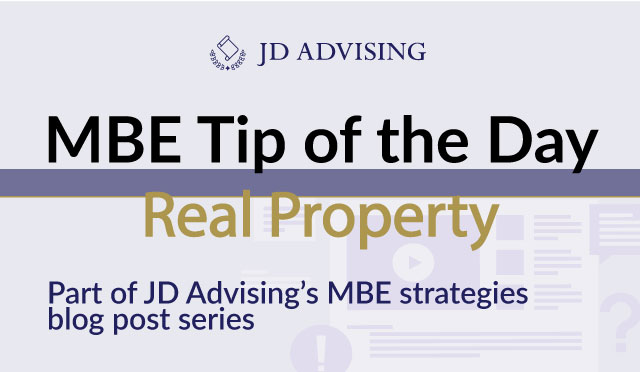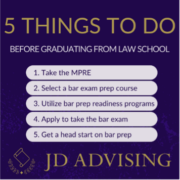MBE Tip of the Day: Real Property
MBE Tip of the Day: Real Property
Welcome to our MBE tip of the day series. This “MBE tip of the day” post focuses on real property.
You will see 25 scored real property MBE questions on the Multistate Bar Exam. In this post, we will review a real property question together. Note that we have posted several MBE tips (which you can find links to at the bottom of this post) that focus on a specific multiple-choice question that many students answer incorrectly. If you can master these questions, it could increase your MBE score by that many points if you see any of these issues tested again (which, by the way, you will!). These posts of MBE tips and tricks will not only cover substantive law but also strategy. So each “MBE tip of the day” post covers one highly-tested area of substantive law as well as an important MBE strategy. You can sign up to receive these posts directly to your inbox for the upcoming administration at the bottom of this page.
MBE Tip of the Day: Real Property
MBE Tip of the Day Instructions:
Do your best to answer this real property MBE question (before even looking at the answer choices and before looking at the answer below!) Ask yourself: What is the subject? What is the legal issue? What is the rule and analysis? Finally, what is the conclusion? Try to answer these beginning questions before even reading the answer choices. Then, uncover the answer as well as read more about our MBE tip of the day.
Show the MBE Question...
Real Property MBE Question
A landlord commercially leased his building to a woman who intended to open an ice cream shop. The woman installed an extensive amount of equipment in the building, which was permitted by the lease agreement, and she began making ice cream. She stored her ice cream in a freezer. However, the building’s cooling system broke and her ice cream all melted. She asked the landlord to fix the cooling system, but he refused. She had to temporarily close her store while searching for a mechanic to fix the cooling system
While the building was unusable for the purpose of storing ice cream, the woman remained on the premises to work on new marketing projects. Angry at the landlord for not fixing the cooling system, which has still not been fixed, the woman refused to make the next rent payment. The landlord began eviction proceedings, and in response, the woman sued the landlord for breach.
Assuming the lease agreement is silent on this matter, who will prevail?
(A) The landlord, because the woman had no legal reason for withholding rent payments.
(B) The landlord, because the woman surrendered the property when she did not pay rent.
(C) The woman, because the landlord breached the implied warranty of habitability.
(D) The woman, because the landlord breached the covenant of quiet enjoyment by constructively evicting her prior to the withholding of rent.
Subject:
Legal Issue:
Legal Rule and Analysis:
Choose an answer choice that most closely matches your conclusion and explain why the others are incorrect:
Show the Answer to the MBE Question...
Answer to the Real Property MBE Question
Subject: Real Property
Legal Issue: Landlord/Tenant law
Legal Rule and Analysis: The tenant has a duty to pay rent. If the tenant does not do so (and does not have a viable excuse for doing so, like if a landlord has violated a certain kind of duty itself), then the landlord is allowed to evict the tenant from the property. The landlord has a duty to deliver residential premises in habitable condition. If it does not, it has breached the implied warranty of habitability and the tenant is allowed to reduce or withhold rent. The landlord is also prohibited from improperly evicting a tenant. This would constitute a breach of the covenant of quiet enjoyment. A constructive eviction occurs when the landlord does something or fails to do something that constitutes a substantial interference and causes the premises to become uninhabitable or unusable. Before a tenant can sue under this theory, it must abandon the premises.
In this case, the landlord did not breach any of its duties, and thus the woman (tenant) improperly withheld rent. The landlord was then allowed to instigate eviction proceedings. The landlord did not breach the implied warranty of habitability because we are told that this is a commercial lease. Courts will not impose a duty to make repairs on a landlord in a commercial lease. The landlord also did not constructively evict the woman because the woman never left the premises. So the woman does not have an excuse for not paying the rent and she has no cause of action for breach of any of the man’s duties.
Conclusion: The landlord will prevail because the woman had no legal reason for withholding rent payments.
Look at the answer choices provided. Choose an answer choice that matches your conclusion. Review the other answer choices provided. The answer choice (A) is therefore correct. (B) is incorrect because a “surrender” situation arises when the tenant does not pay rent and has also abandoned the property. Here, the woman did not abandon the property. (C) is incorrect because the implied warranty of habitability only arises in residential leases. We are told that this is a commercial lease, so the landlord does not have the duty to make repairs. (D) is incorrect because a constructive eviction cannot have occurred unless the tenant abandons the premises. Here we are told that the woman remained on the premises to work on marketing projects.
MBE Tip: Even the smallest details can make a huge difference in the analysis. In fact, sometimes they are outcome determinative. Thus, as you are reading the question, you should not gloss over any of the tiny details. Further, when you are studying, try to memorize how various distinctions (like between a residential and commercial lease) change the rules that will be applied. These distinctions are ripe for testing on the bar exam, and you should be on the lookout for them when you read through MBE questions!
Show Summary of the Two Key Takeaway Points for the Day
Key Takeaways and MBE Tips From Prior Posts
Takeaway for the Law: A landlord can evict a tenant for a failure to pay rent if the tenant does not have a valid excuse for doing so. However, the failure of the landlord to make repairs will not be a valid excuse to withhold rent if the lease is of a commercial nature.
MBE Tip: Don’t overlook the tiny details that can completely change what rule you apply!
Want to See Past MBE Tip of the Day Posts?
If you would like to see “MBE tip of the day” posts from prior days, please check out all of our past MBE tip of the day archives here! We have several of them and we list them by subject!
Looking for additional MBE help? If you are looking for MBE help, read our 10 expert MBE tips here. Check out our step-by-step guide to improving your MBE score, please review this post for an overview of tips. If you would like to have the next MBE tip emailed to you when we come out with another one, please fill out the form below.
MBE Tip of the Day
Seeking MBE Assistance?
Seeking MBE Assistance?
- 📘 MBE Guide: Equip yourself with our FREE expert-crafted bar exam and MBE guides.
- Free Bar Exam Resource Center: Discover top resources, articles, and free webinars led by renowned bar exam professionals.
Top Resources as Vouched by our Students:
- MBE One-Sheets: One of our most highly acclaimed bar exam supplements!
- Bar Exam Outlines: Our comprehensive and condensed bar exam outlines present key information in an organized, easy-to-digest layout.
- MBE Private Tutoring: Opt for personalized, effective strategies.
- On Demand Bar Exam Course: Comprehensive bar exam preparation.
- Bar Exam Crash Course and Mini Outlines: Acclaimed and effective for a quick refresher.
- MBE Mastery Class, Real MBE Questions, and MBE Guide: Elevate your MBE preparation with these high-quality MBE supplements!
🔥 NEW! Check out our Repeat Taker Bar Exam Course and get introduced to our unmatched platinum Guarantee Pass Program.




